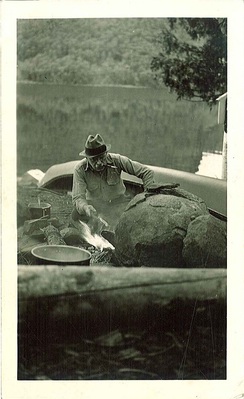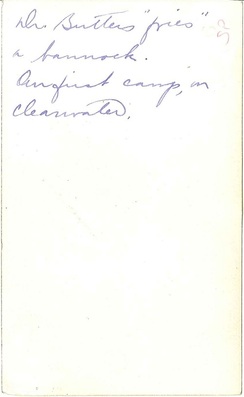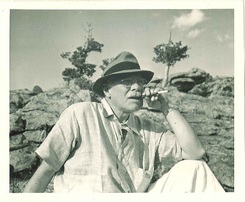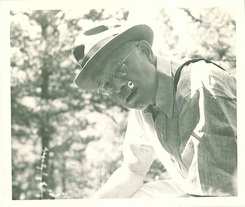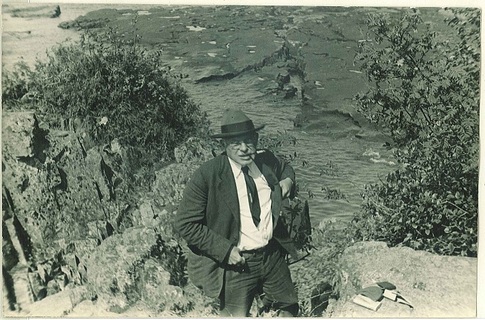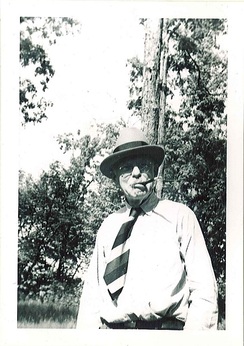Ernst Abbe, University of Minnesota instructor, began a memorial article about his colleague Frederic K. Butters with the following quote:
“‘Felix qui potuit rerum cognoscere causas
Atque metus omnes, et inexorabile fatum
Subject pedibus’ – VergilFred Butters appreciated the truth of Vergil’s aphorism, translating it ‘Happy the man who is able to know the causes of things, and to put under his feet all fear and inexorable fate.’ It is a sentiment which expresses succinctly and aptly the guiding principles of his rich and friendly life.“
In the following pages of an article reprinted from Rhodora, Volume 50, June 1948, Abbe described that rich and friendly life by not only acknowledging his colleague’s accomplishments in the natural sciences, but also by touching upon the subtleties of his personality. Photographs found within the University Archives photograph collection illustrate Abbe’s portrait of Butters.
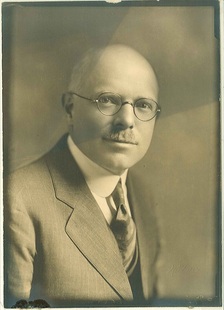 Fred Butters was born in Minneapolis in 1878. He attended Central High School, and upon graduation in June 1895, enrolled in the “Scientific Course” of the College of Science, Literature, and the Arts at the University of Minnesota. Butters received instruction from Conway MacMillan, head of the newly formed Department of Botany (est. 1889). Butters graduated from the University in 1899, went on to obtain an A.B. from Harvard in 1900, and was hired as an instructor in Botany at the University in 1901. He remained a member of the faculty until his death in 1945.
Fred Butters was born in Minneapolis in 1878. He attended Central High School, and upon graduation in June 1895, enrolled in the “Scientific Course” of the College of Science, Literature, and the Arts at the University of Minnesota. Butters received instruction from Conway MacMillan, head of the newly formed Department of Botany (est. 1889). Butters graduated from the University in 1899, went on to obtain an A.B. from Harvard in 1900, and was hired as an instructor in Botany at the University in 1901. He remained a member of the faculty until his death in 1945.
Butters participated, along with MacMillan and other professors within the department, in study at the Minnesota Seaside Station on Vancouver Island, British Columbia, Canada. He co-published with professor Carl Otto Rosendahl, a series of guides on Minnesota plant life and flowers. Beginning in 1915, Butters and Rosendahl spent many summers in the field, exploring hard to reach areas to document flora unique to the state. Other colleagues joined him in fieldwork throughout his tenure. Abbe recalled, “It was the good fortune of the writer to be his companion of many trips to Cook County. These were indeed a revelation since there is no better way to become acquainted with a man than to camp with him, and these experiences have left nothing but admiration and affection.“
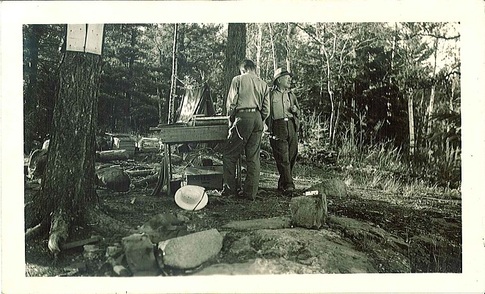
Caption: “Merrill sorts the days’ collection of plants while Dr. Butters admires the scenery. Our first camp, on Clearwater Lake. P.S. We inherited the table from previous campers.”
Abbe further commented on “camp life” with Butters:
“They also provided an opportunity to become acquainted with an old mountaineer’s field cuisine. And it was not the old mountaineer who developed acidosis from the monotonous diet of pancakes and bacon, bannock and bacon, cheese and raisins, and rice and raisins!”
“Even yet we find about the Department an occasional box in which came his favorite Benson and Hedges cigarettes, the white paper covered with the details of the expansion of a binomial.”
To end this brief profile of an early contributor to the exploration of Minnesota’s natural history, it is fitting to include Abbe’s reference to a poem written by one of Butters’ students:
“Professor Butters
Beside a cluttered desk I sit
Mid books and paper piled high
My jaws clamped on a cigarette
Which sprinkles ash on coat and tie.Leisurely I turn the pages
Of a book I know by heart
For the wisdom of the sages
It’s my duty to impart.”
